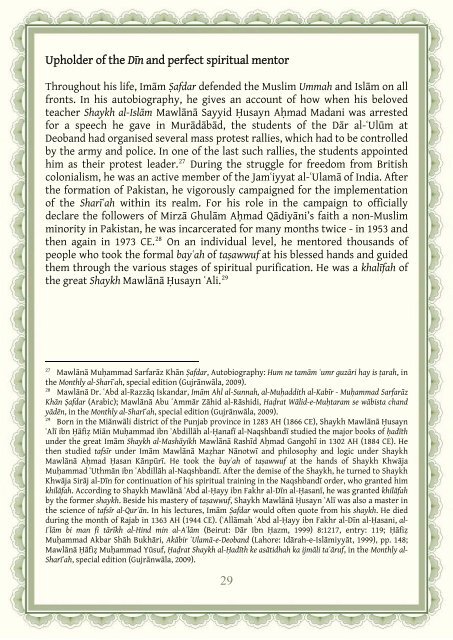Create successful ePaper yourself
Turn your PDF publications into a flip-book with our unique Google optimized e-Paper software.
Upholder of the Dīn and perfect spiritual mentor<br />
Throughout his life, Imām Ṣafdar defended the Muslim Ummah and Islām on all<br />
fronts. In his autobiography, he gives an account of how when his beloved<br />
teacher Shaykh al-Islām Mawlānā Sayyid Ḥusayn Aḥmad Madani was arrested<br />
for a speech he gave in Murādābād, the students of the Dār al-ʿUlūm at<br />
Deoband had organised several mass protest rallies, which had to be controlled<br />
by the army and police. In one of the last such rallies, the students appointed<br />
him as their protest leader. 27 During the struggle for freedom from British<br />
colonialism, he was an active member of the Jamʿiyyat al-ʿUlamā of India. After<br />
the formation of Pakistan, he vigorously campaigned for the implementation<br />
of the Sharīʿah within its realm. For his role in the campaign to officially<br />
declare the followers of Mirzā Ghulām Aḥmad Qādiyāni’s faith a non-Muslim<br />
minority in Pakistan, he was incarcerated for many months twice - in 1953 and<br />
then again in 1973 CE. 28 On an individual level, he mentored thousands of<br />
people who took the formal bayʿah of taṣawwuf at his blessed hands and guided<br />
them through the various stages of spiritual purification. He was a khalīfah of<br />
the great Shaykh Mawlānā Ḥusayn ʿAli. 29<br />
27<br />
Mawlānā Muḥammad Sarfarāz Khān Ṣafdar, Autobiography: Hum ne tamām ʿumr guzāri hay is ṭarah, in<br />
the Monthly al-Sharīʿah, special edition (Gujrānwāla, 2009).<br />
28<br />
Mawlānā Dr. ʿAbd al-Razzāq Iskandar, Imām Ahl al-Sunnah, al-Muḥaddith al-Kabīr - Muḥammad Sarfarāz<br />
Khān Ṣafdar (Arabic); Mawlānā <strong>Abu</strong> ʿAmmār Zāhid al-Rāshidi, Haḍrat Wālid-e-Muḥtaram se wābista chand<br />
yādēn, in the Monthly al-Sharīʿah, special edition (Gujrānwāla, 2009).<br />
29<br />
Born in the Miānwāli district of the Punjab province in 1283 AH (1866 CE), Shaykh Mawlānā Ḥusayn<br />
ʿAlī ibn Ḥāfiẓ Miān Muḥammad ibn ʿAbdillāh al-Ḥanafī al-Naqshbandī studied the major books of ḥadīth<br />
under the great Imām Shaykh al-Mashāyikh Mawlānā Rashīd Aḥmad Gangohī in 1302 AH (1884 CE). He<br />
then studied tafsīr under Imām Mawlānā Maẓhar Nānotwī and philosophy and logic under Shaykh<br />
Mawlānā Aḥmad Ḥasan Kānpūrī. He took the bayʿah of taṣawwuf at the hands of Shaykh Khwāja<br />
Muḥammad ʿUthmān ibn ʿAbdillāh al-Naqshbandī. After the demise of the Shaykh, he turned to Shaykh<br />
Khwāja Sirāj al-Dīn for continuation of his spiritual training in the Naqshbandī order, who granted him<br />
khilāfah. According to Shaykh Mawlānā ʿAbd al-Ḥayy ibn Fakhr al-Dīn al-Ḥasanī, he was granted khilāfah<br />
by the former shaykh. Beside his mastery of taṣawwuf, Shaykh Mawlānā Ḥusayn ʿAlī was also a master in<br />
the science of tafsīr al-Qurʾān. In his lectures, Imām Ṣafdar would often quote from his shaykh. He died<br />
during the month of Rajab in 1363 AH (1944 CE). (ʿAllāmah ʿAbd al-Ḥayy ibn Fakhr al-Dīn al-Ḥasani, al-<br />
Iʿlām bi man fi tārīkh al-Hind min al-Aʿlām (Beirut: Dār Ibn Ḥazm, 1999) 8:1217, entry: 119; Ḥāfiẓ<br />
Muḥammad Akbar Shāh Bukhāri, Akābir ʿUlamā-e-Deoband (Lahore: Idārah-e-Islāmiyyāt, 1999), pp. 148;<br />
Mawlānā Ḥāfiẓ Muḥammad Yūsuf, Ḥaḍrat Shaykh al-Ḥadīth ke asātidhah ka ijmāli taʿāruf, in the Monthly al-<br />
Sharīʿah, special edition (Gujrānwāla, 2009).<br />
29














